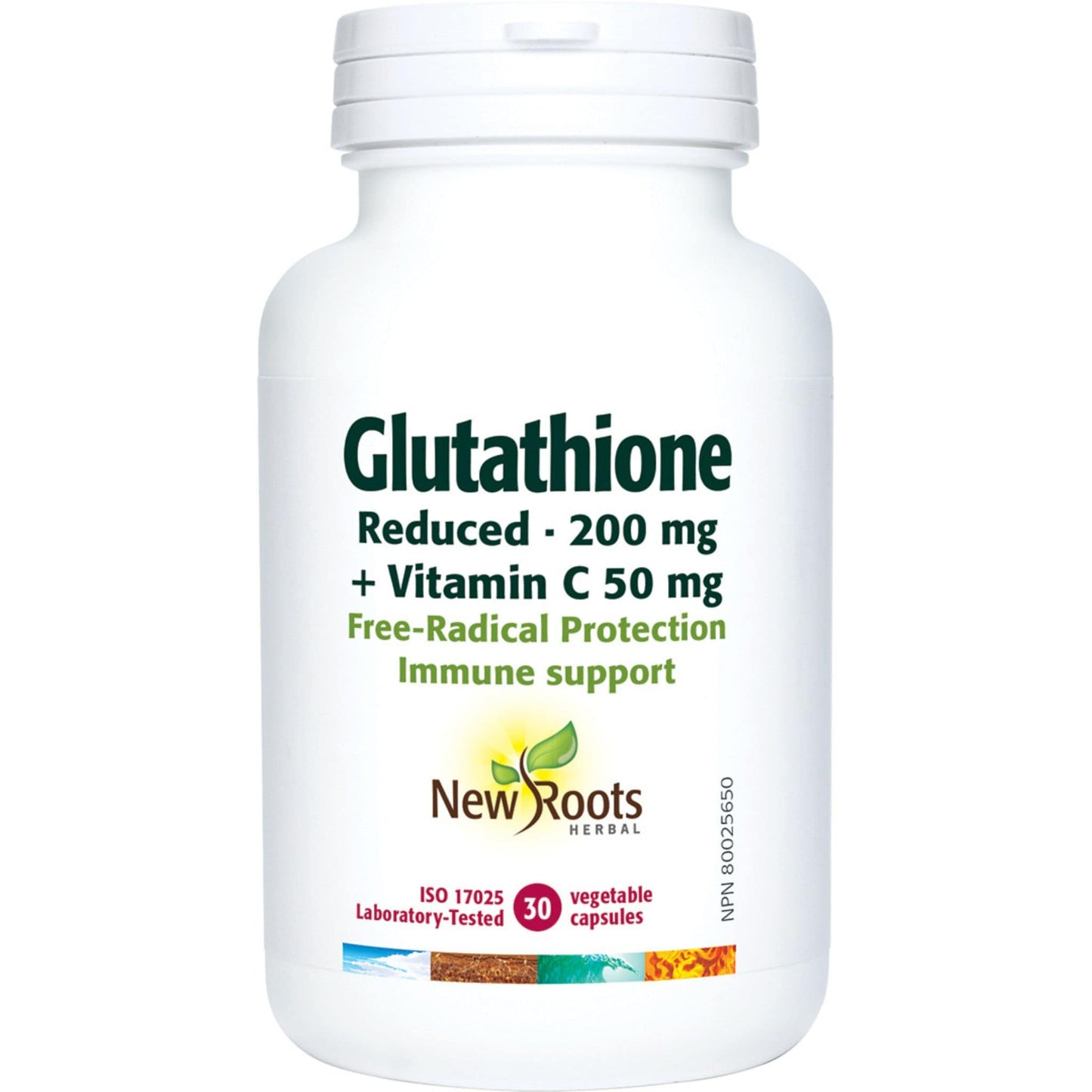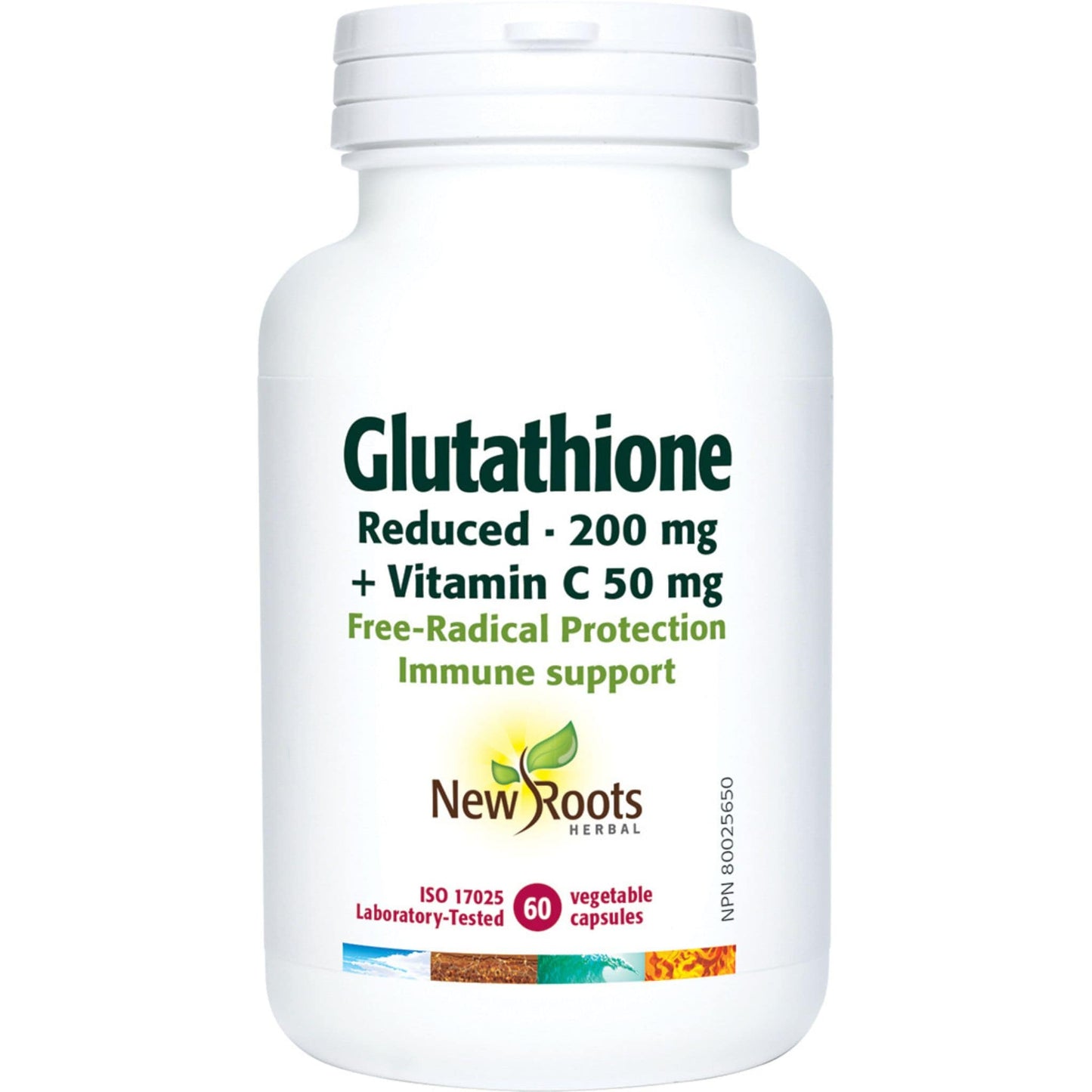Low price guarantee
Vitamart always has low prices and to give you full confidence we have a "Low Price Guarantee".
Find a lower online price at a major Canadian competitor and we will beat the price by 1¢!
To redeem: contact us with proof of the lower price (ie. website link) before or within 10 days of purchase and Vitamart will verify the price and refund you the difference.
Restrictions:
Competitor must ship from and be based in Canada. Vitamart does not offer a guarantee on all competitors, such as marketplaces. Product must be identical and in-stock. Does not apply to clearance, short-dated, out of date promotions, multiple buying discounts ie Buy X for $X, Spend $X get X Free, loyalty/member discount offers, or website typos. Vitamart reserves the right to deny any price claim and to limit quantities for any reason.
New Roots Glutathione 200mg with Vitamin C, Reduced, Supports Detoxification of chemicals, pollutants, alcohol and drugs, 30-60 Capsules
New Roots Glutathione 200mg with Vitamin C, Reduced, Supports Detoxification of chemicals, pollutants, alcohol and drugs, 30-60 Capsules
-
Sale Sold outRegular price $17.09 CADSale price $17.09 CAD Regular priceUnit price per
-
In Stock
- Notify me when the price drops
Save money with volume discounts!
-
Buy 3+$17.09 $16.75 / eachsave 2%
-
Buy 6+$17.09 $16.58 / eachsave 3%
-
Buy 12+$17.09 $16.24 / eachsave 5%
-
Enjoy secure payments powered by:
- Visa
- Master
- Apple pay
- Paypal
- Google pay
- Shopify pay
- American express
60-day Risk Free Shopping guarantee Learn more



New Roots Glutathione 200mg with Vitamin C, Reduced, Supports Detoxification of chemicals, pollutants, alcohol and drugs, 30-60 Capsules
:by New Roots
If you find a lower price, we'll beat it
Quality products you can depend on
Canadian orders $79+ ship free
Not happy? Return it within 60 days
New Roots Glutathione 200mg Details
This powerful antioxidant is produced by the body in the liver from the amino acids cysteine, glutamic acid and glycine. Responsible for a number of antioxidants functions, Glutathione may be considered one of the most important antioxidants in our bodies. New Roots herbal offers a 200 mg of reduced glutathione per capsule in a non GMO vegetarian capsule. A wise choice for those who smoke or drink and those who are concerned with heavy metal toxicity, liver disorders and free radical damage. [CAPSULE]
New Roots Glutathione Reduced Highlights:
- Powerful antioxidant.
- Helps the body detoxify chemicals, pollutants, alcohol and drugs.
- Boosts immune function and helps protect the liver.
- May be helpful for respiratory conditions.
- Reduced for better absorption.
The manufacturers of high quality therapeutic strength nutrient and herb combinations for specific health concerns including: Prostate Perform, Candida Stop, Freedom Greens, & Plant Digestive Enzymes.
New Roots Glutathione Reduced as Anti-oxidant
Recent research suggests that reduced gluthathione may be an even more effective anti-oxidant than vitamin E and vitamin C.
- Glutathione is a sulphur-based molecule made from three amino acids cysteine, glycine and glutamic acid. It is an important antioxidant in the liver’s detoxification pathways. Glutathione changes chemicals and metabolic byproducts into harmless substances for excretion from the body, by deactivating harmful free radicals.
- Glutathione is responsible for detoxifying many compounds, including those found in cigarette smoke, alcohol, aspirin and acetaminophen. As an antioxidant in other parts of the body, glutathione protects red blood cells, helps immune cells kill invading microbes and stops cells from being harmed by radiation.
- Glutathione can be administered directly to the lungs to help reduce free radical damage in conditions such as chronic bronchitis, emphysema and asthma. It is recommended by natural health practitioners for conditions such as frequent colds and flus, hair loss, peptic ulcers, drug and alcohol overdose and decreased liver functioning.
- Glutathione is available as an encapsulated powder. It must be in a reduced form in order to be metabolically active. Purchase only supplements that say “reduced” on the label. There is controversy surrounding the body’s ability to absorb glutathione in the intestinal tract. Some studies show that taking the precursors to glutathione (L-cysteine or N-acetylcysteine), L-methionine or DHEA (dehydroepiandrosterone) actually raises the body’s glutathione levels more than taking glutathione itself. Some practitioners can also administer glutathione as an inhalation for chronic respiratory disorders.
The Liver
The liver is the largest gland in the body and one of the most important organs. It has many functions. It produces bile, the digestive juice that breaks down fats and helps to absorb fat-soluble vitamins. Bile also stimulates intestinal contractions, to promotes regularity, and converts beta-carotene into vitamin A. The liver acts as filter for all of the blood in the body.
Blood from the intestines, carrying nutrients, goes to the liver where some vitamins and minerals are stored. The liver also metabolizes fat into cholesterol, phospholipids (for cell membranes) and lipoproteins (for carrying other molecules). The liver plays a role in blood sugar regulation by making glucose tolerance factor. Sugar can be stored in the liver for later use and extra food is converted to fat by the liver and then transported to the fatty tissue.
The liver also filters ammonia, a natural by-product of protein breakdown, environmental toxins, medications and alcohol. It changes these harmful products into less harmful metabolites that can then be put back into circulation and excreted by the kidneys and intestines.
The last function of the liver is in hormone metabolism. It converts thyroid hormone into its most active form and breaks down hormones like sex hormones, adrenaline and insulin when they are not needed
Diet & Lifestyle Support for Healthy Liver Function
Liver supportive foods include artichokes, black radish, beets, carrots, spinach, sauerkraut, tomatoes and watercress. Make sure that you are getting enough water-soluble fibre in your diet, as found in apples, oats and supplemental inulin. They help to eliminate bile and toxins from the intestines. Avoid sugar, alcohol, red meat, trans-fatty acids and processed foods. They are difficult for the liver to process. Avoid high doses of niacin and vitamin A because they can raise liver enzymes.
Avoid excessive use of alcohol, medications and recreational drugs. Exercise promotes liver health by increasing circulation. It also stimulates the bowels to release processed toxins. Slow bowel transit time allows toxins to re-circulate in the body and forces the liver to repeat its detoxifying activity.
Traditional Asian medicine identifies emotions as a contributing agent in many disease processes. The liver is affected by anger. Anger reduction techniques, like biofeedback, or activities, such as yoga, can improve liver functioning.
Sometimes the liver’s pathways are not working up to speed or become blocked. The back up of waste material makes it harder for the rest of the body to function normally and ultimately leads to disease. Since the environment in which we live makes it impossible for us to maintain a pristine lifestyle, regular liver cleansing is essential. Liver detoxification involves dietary, supplemental and physical interventions. For more information see the article on detoxification.
Suggested Use
Adults: Take 1 capsule daily or as directed by your health-care practitioner.
Nutrition Facts / Valeur nutritive
| Each vegetable capsule contains: | |
| Glutathione | 200 mg |
| Vitamin C (ascorbic acid) | 50 mg |
| Other ingredients: Vegetable magnesium stearate, microcrystalline cellulose, and silicon dioxide in a non‑GMO vegetable capsule composed of vegetable carbohydrate gum and purified water. | |



